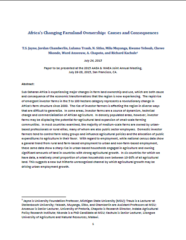
Sub-Saharan Africa is experiencing major changes in farm land ownership and use, which are both cause and consequence of the economic transformations that the region is now experiencing. The rapid rise of emergent investor farms in the 5 to 100 hectare category represents a revolutionary change in Africa’s farm structure since 2000.The rise of investor farmers is affecting the region in diverse ways that are difficult to generalize.
In some areas, investor farms are a source of dynamism, technical change and commercialization of African agriculture. In densely populated areas, however, investor farms may be displacing the potential for agricultural land expansion of small-scale farming communities. In most countries examined, the majority of medium-scale farms are owned by urban-based professionals or rural elites, many of whom are also public sector employees.
Domestic investor farmers tend to control farm lobby groups and influence agricultural policies and the allocation of public expenditures to agriculture in their favor. With regard to employment, while national census data show a general trend from rural and farm-based employment to urban and non-farm-based employment, these same data show a sharp rise in urban-based households engaged in agriculture and owning significant amounts of land in countries with strong agricultural growth.
In six countries for which we have data, a relatively small proportion of urban households own between 10-30% of all agricultural land. This suggests a new but hitherto unrecognized channel by which agricultural growth may be driving urban employment growth.
